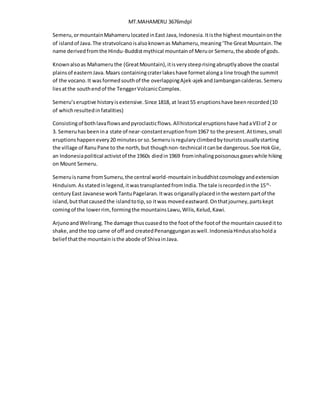MT.SEMERU
- 1. MT.MAHAMERU 3676mdpl Semeru, or mountain Mahameru located in East Java, Indonesia. It is the highest mountain on the of island of Java. The stratvolcano is also known as Mahameru, meaning ‘The Great Mountain. The name derived from the Hindu-Buddist mythical mountain of Meru or Semeru, the abode of gods. Known also as Mahameru the (Great Mountain), it is very steep rising abruptly above the coastal plains of eastern Java. Maars containing crater lakes have formet along a line trough the summit of the vocano. It was formed south of the overlapping Ajek-ajek and Jambangan calderas. Semeru lies at the south end of the Tengger Volcanic Complex. Semeru’s eruptive history is extensive. Since 1818, at least 55 eruptions have been recorded (10 of which resulted in fatalities) Consisting of both lava flows and pyroclastic flows. All historical eruptions have had a VEI of 2 or 3. Semeru has been in a state of near-constant eruption from 1967 to the present. At times, small eruptions happen every 20 minutes or so. Semeru is regulary climbed by tourists usually starting the village of Ranu Pane to the north, but though non-technical it can be dangerous. Soe Hok Gie, an Indonesia political activist of the 1960s died in 1969 from inhaling poisonous gases while hiking on Mount Semeru. Semeru is name from Sumeru, the central world-mountain in buddhist cosmology and extension Hinduism. As stated in legend, it was transplanted from India. The tale is recorded in the 15th-century East Javanese work Tantu Pagelaran. It was origanally placed in the western part of the island, but that caused the island to tip, so it was moved eastward. On that journey, parts kept coming of the lower rim, forming the mountains Lawu, Wilis, Kelud, Kawi. Arjuno and Welirang. The damage thus cuased to the foot of the foot of the mountain caused it to shake, and the top came of off and created Penanggungan as well. Indonesia Hindus also hold a belief that the mountain is the abode of Shiva in Java.
